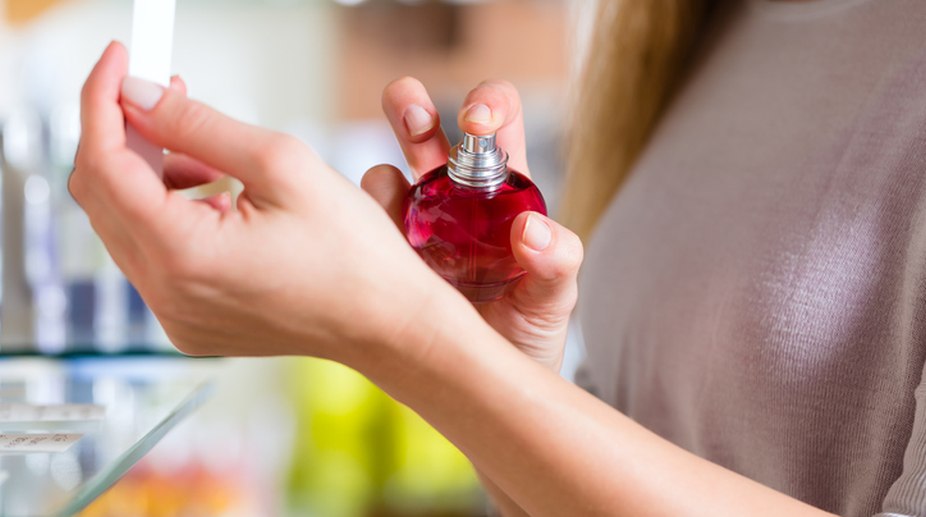Fragrant festivities
Celebrations call for the scintillation of scents. KRISHNARAJ IYENGAR noses-up for Raksha Bandhan.
Signature scent is uniquely our own, so what may smell good on others may not smell as good on our skin.
Deepa Gupta | New Delhi | July 19, 2017 8:51 am | Updated : September 13, 2017 10:11 am

(Getty Images)
Why do people use perfume? Men and women alike have their reasons for using fragrances. Some just like to smell good, and smelling good enhances their well-being. Some use perfume to make a grand statement as they enter a room and to leave an impression as they go out. Some enhance their natural scent with perfume so they would be seductive and appealing to the opposite sex. There are many reasons people use fragrances.
Unique Signature Scents
Advertisement
When you buy perfumes, however, you have to be careful. It is unwise to just pick up a bottle and head off to the counter to buy one. You have to test it on your skin first. Not only is it possible that you could be allergic to some perfumes, but a fragrance that smells nice on one person may not smell the same on you.
Advertisement
There is something that biochemists and manufacturers of perfumes alike call the signature scent. This signature scent refers to the particular chemical makeup of the body, which dictates how our skin will take to any fragrance that we apply onto it. We all have unique signature scents because it is determined by our particular lifestyle habits and choices, diet, the medication that we take if we are taking any, our skin type and colouring, and many other factors. Thus, because of signature scent, a specific fragrance will smell differently on different people.
The Three Elements of Fragrance
The scent of a perfume is determined by three elements: the theme of the fragrance, its notes and its concentration. Knowing about these three elements can help you decide on which would be the best perfume that would suit you and your personality.
Theme is what creates variation among fragrances. It is also called accord and is dependent on the base upon which the perfume is formulated, and there are four common bases used in formulating perfumes. These four are:
Citrus – created from fruits rich in citric acid, like oranges, bergamots and lemons, always light and fresh-smelling.
Earth – lends an air of mystery upon the wearer, formulated from minerals or from non-flowering plants such as cinnamon, vanilla, honey and sandalwood.
Musk – always considered sexy and alluring, and though previously made from the sacs of animals such as the civet and the Asian musk deer, they are now created synthetically.
Floral – the most common theme among perfumes; as the name suggests, they are made from the essence of flowers and are often strong, clinging and sweet.
The notes of a perfume, on the other hand, are what are known as the impressions of the fragrance. It is the lingering air left by the perfume as it evaporates from the skin. All scents have three notes, called the top, the heart and the base.
Top note – the instant impression created by the fragrance. It is supposed to attract people to the scent, but it quickly dissipates.
Heart note – called the body of the perfume, the perfume’s essence. It tells the smeller what the fragrance is supposed to be about.
Base note – the scent that lingers after the top note and the heart note evaporates. It is the main message of the perfume.
The last element to be considered is the concentration of the perfume. Concentration indicates how pure the perfume is, or the amount of perfume oil added into the fragrance. The purest perfume is known to be extremely volatile and can cause irritations when applied right onto the skin. To prevent this and to allow users to enjoy fully the fragrance, perfume oils are mixed into ethanol, with water sometimes added in.
Perfume extracts are the most concentrated among fragrances. They are meant to be used sparingly and only on the body’s pulse points. Coming after perfume extracts in terms of concentration is the eau de parfum, and after that, the eau de toilette. These two are often sprayed all over the body. The least concentrated of fragrances is the eau de cologne.
Tips on How to Buy Perfume
Here are a few tips to keep in mind when buying a scent for yourself.
Never buy a scent just because you liked how it smelled on someone else. Remember that our signature scent is uniquely our own, so what may smell good on others may not be as good on our skin.
Never be in a rush when buying perfume. The best way to test a fragrance is to spray some on your wrist and let it linger for 30 minutes. It usually takes a scent to display all its three notes within 30 minutes. If you like what you smell on yourself after that time, go ahead and buy the fragrance.
Always get a scent that expresses your personality. You should always think of the fragrances you wear as extensions of yourself.
Always remember that the chemical makeup of a perfume is delicate. Therefore, never store your fragrances in extremely cold or extremely hot places, or where they can be caught by direct sunlight.
Never hoard your perfumes or else they will just evaporate.
Advertisement
Celebrations call for the scintillation of scents. KRISHNARAJ IYENGAR noses-up for Raksha Bandhan.
“Every season has its own distinct scent,” says Krishnaraj Iyengar, our contributor, who is a connoisseur of perfumes and a perfumer himself
To beat the monsoon blues, KRISHNARAJ IYENGAR takes off on an off-beat olfactory picnic around Mumbai.
Advertisement
